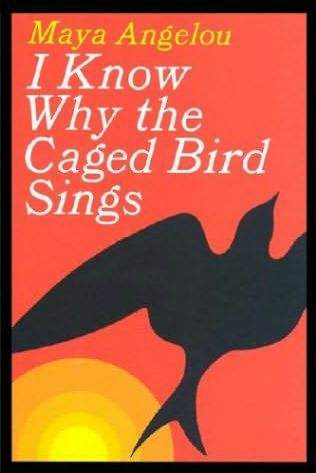Posted by Bel. The time is 4:05pm here in Wellington, NZ.
 Maya Angelou's I Know Why The Caged Bird Sings is an autobiographical story of growing up as a young black girl in a world defined by its boundaries, yet still determined to grow and flourish despite all set-backs.
Maya Angelou's I Know Why The Caged Bird Sings is an autobiographical story of growing up as a young black girl in a world defined by its boundaries, yet still determined to grow and flourish despite all set-backs.Early in the book, there is a wonderful example of the lack of perspective that segregation brings. Young Maya sees the laundry baskets carried by the women who do housework for white households in the area. She is amazed to spy among the heaps of clean clothing the same style of underwear that she and her family wear! To her, whites are akin to an alien species. To imagine that they would be wearing underwear and doing normal everyday things is simply impossible.
As well as these basic insights, there are some moments in the book that are truly shocking. Because Maya's grandmother runs the general store, she has been able to help out local people during the worst times of the Depression. This includes a white dentist who lives on the other (wealthy) side of town. She calls on him to repay the favour when Maya is crippled by toothache. They approach the house via the servants' entrance after walking across the distance of the town, the little girl howling all the way with pain.
The reception they receive is chilling. The dentist flatly refuses to help them, culminating with the brutal statement that he would no more put his hand inside a negro's mouth than he would a dog's.
There are many difficult and even traumatic moments related in the book - the sexual abuse and rape that takes place when Maya is eight years old is the hardest to read, regardless of the outcome, in which he is taken to court and then murdered by her uncles. But overall the tone is positive and uplifting. This is not someone who is overwhelmed and downtrodden by the circumstances, and there is some comfort in thinking that the young girl of this "story" will experience the civil rights revolution of the 1960s and all that will entail.
One of my favourite moments of Obama's election was this interview with Maya Angelou, where (if you watch through to the end) she recites my favourite poem of hers. Watching it the morning after America elected a black man to its highest office, tears were brought to my eyes.
Maya Angelou on Barack Obama's presidential win and reciting "Still I Rise"
(Can't embed the video, sorry - you will have to click over to Jezebel to enjoy it!)
PS It should be noted that Angelou read a poem at Bill Clinton's inauguration - he who was famously called "the first black US president" by none other than Toni Morrison, author of The Color Purple and also Beloved, which is on 'The List' and I thought I reviewed ages ago but now I can't find a post for. Whoops.
--
I Know Why The Caged Bird Sings by Maya Angelou. Highly recommended.
First published in 1969. Set in Arkansas, Missouri & California, 1930s/40s.
#40 on The List. 24 left to go!

Post a Comment